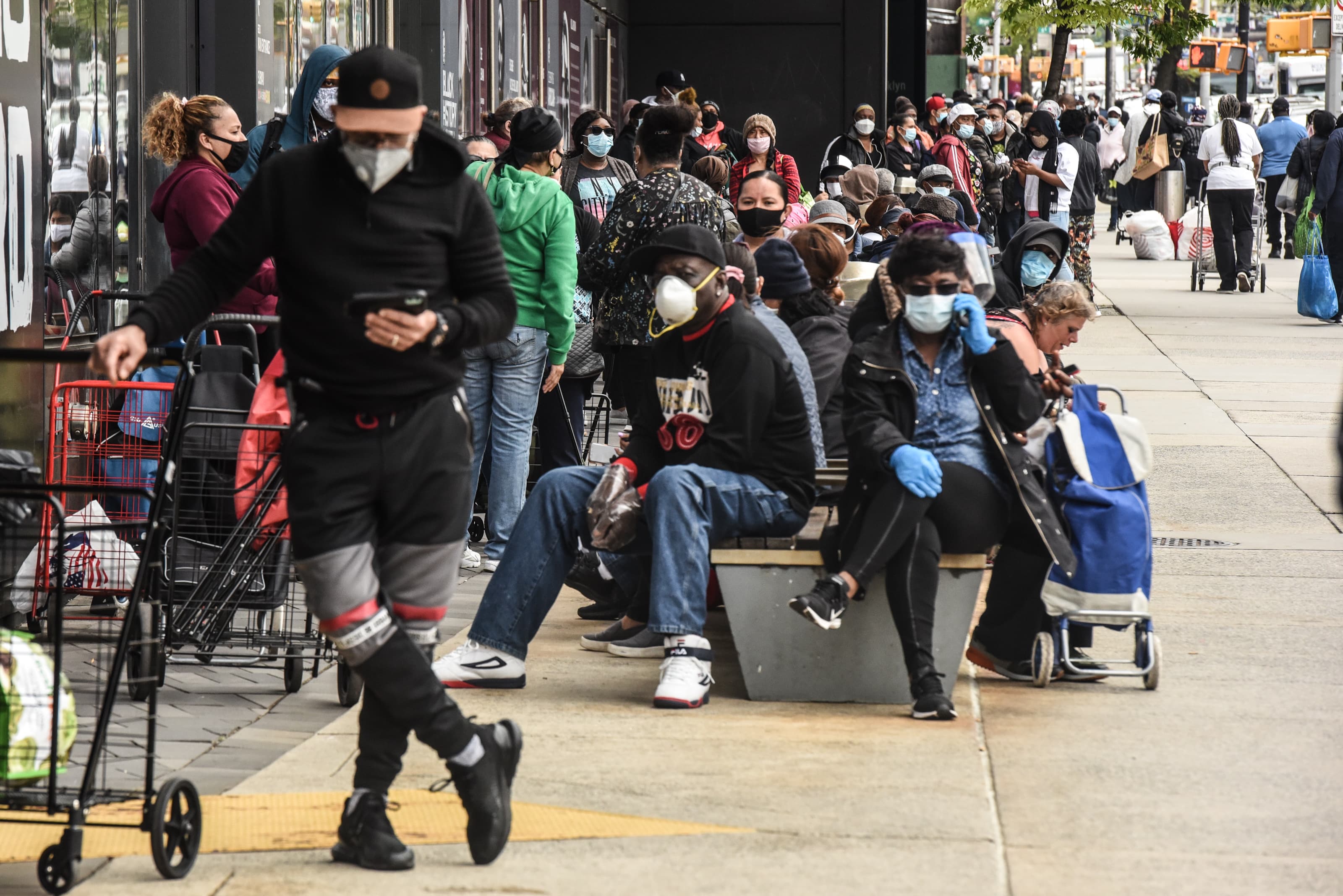People wait on a long line to receive a food bank donation at the Barclays Center on May 15, 2020 in the Brooklyn borough in New York City. The event was organized by Food Bank for New York City and included dairy and meat items.
Stephanie Keith | Getty Images
Nearly 4 million people came off unemployment benefits earlier this month as the economy began to reopen, but the unemployment rate is still expected to jump to nearly 20% in May.
There was a decline of 3.86 million in continuing claims to 21.05 million, for the week ended May 16. It is the biggest reversal in the claims data so far. There have been over 40.8 million claims filed for state benefits in the past 10 weeks, since businesses, stores and restaurants abruptly shutdown. But there are still many more workers who may not be able to return to jobs, even if their employers reopen.
“Our assessment is the labor market is still in very bad shape,” said Luke Tilley, chief economist at Wilmington Trust. “We are optimistic that reopenings of the economy and the SBA’s [Payroll Protection Program] will bring some people back, but we don’t think it will stop the unemployment rate from being much higher in next week’s report or will bring unemployment down quickly over the second half of the year.”
There were 2.12 million initial claims filed for the week ending May 23, down from the revised 2.44 million the week earlier. The continuing claims data is for the week prior to that.
Another number that economists are following in the claims report is the number of people counted separately and are receiving benefits under the Pandemic Unemployment Assistance program. There were 1.19 initial claims filed under that program for the week ended May 23. That program was made available under the CARES Act, and reaches self-employed and gig workers.
“These are just enormous numbers,” said Chris Rupkey, chief financial economist at MUFG Union Bank. “It’s still at least three times more than the number of people filing claims in any week of the Great Recession.
“The Pandemic Unemployment Assistance Program of mostly gig workers rose to 7.8 million in the May 9 week,” he said. “It’s still the worst labor market since the Great Depression. That’s not going away. If there’s any ray of hope in the numbers, the crest of the joblessness wave is very, very near the peak, if not at the peak.”
The total continuing claims reported under the Pandemic Unemployment Assistance data is delayed by two weeks. Rupkey said the number of unadjusted continuing claims and those on PUA totaled 30.6 million for the week ending May 9.
Economists say the sheer magnitude of unemployed has made it difficult to get an accurate picture of the job losses, starting with the fact that states have not been able to completely process those that filed weeks ago.
About 7.5 million jobs were expected to have been lost in May on top of the 20.5 million in April, according to Refinitiv. The unemployment rate is expected to rise to 19.8%, from the 14.7% in April. That’s because about 78% of the unemployed people surveyed by the government in April viewed their layoffs as temporary, and they may not have shown up in the unemployment rate since they were not looking for jobs.
Economists expect more workers to now see their job losses as permanent.
“I think the continuing claims probably tells you the story a little better,” said Drew Matus, chief market strategist at MetLife Investment Management. “It’s encouraging, but it doesn’t change the fact that we are in for an extended period of much higher unemployment than anyone in this country is used to.”
Matus said staffing is not going to return to where it was before the virus outbreak any time soon. “There’s going to be a substantial haircut to the number of jobs in those sectors,” he said. He said workers will have to transition from those jobs and will need to be trained in new areas.
“The May number is going to look bad, but the question is, is it really telling us anything? Maybe we’re better off looking at the consumer confidence numbers which seem to be stabilizing,” said Matus. Consumer confidence rose unexpectedly in May, and consumer sentiment for May is reported Friday.
“The worrisome issue is what is the level we’re going to hit where we’re going to plateau for awhile. It shows there’s no easy fix, and it could be more persistent than we’d like to see,” said Diane Swonk, chief economist at Grant Thornton.
As stores and restaurants reopen, they are changing the way they operate to comply with social distancing. “When you’re talking about 25% to 50% of capacity, how many can they rehire?” Swonk said.
